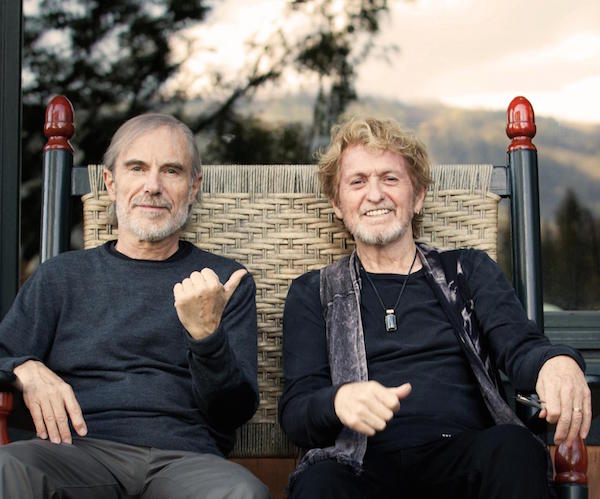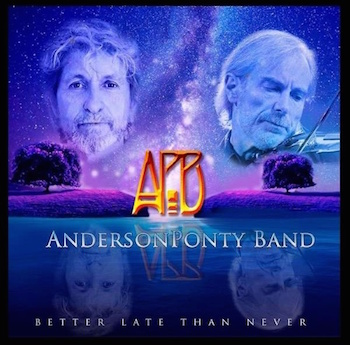Music Interview: Fusion Violinist Jean-Luc Ponty and Jon Anderson Join Forces
I just have to use all my personal musical experience—classical music and jazz and rock rhythms and electronic sound—and not worry about where it fits.

Jon Anderson and Jean-Luc Ponty will perform this Saturday at the Berklee Performance Center. Photo: Cathy Miller.
By Brett Milano
Though they never played together before last year, fusion violinist Jean-Luc Ponty and ex-Yes singer Jon Anderson have been in each other’s orbits for decades. They were tourmates in 1974, when Yes were taking some musical hints from Ponty’s then-current band, the Mahavishnu Orchestra. Ponty in turn went onto a solo career that was informed by progressive rock (indeed, his guitarist Daryl Stuermer later wound up in Genesis). Neither is a stranger to epic tracks or cosmic themes.
The two joined forces in the Anderson Ponty Band last year, playing a single Kickstarter-sourced concert in Aspen, Colorado. They’ve now launched the band in earnest, with the part-live/part-studio album Better Late Than Never—combining new material, rearranged Yes favorites, and vintage Ponty pieces with newly added lyrics. They play Berklee Performance Center this Saturday.
The Arts Fuse spoke to Ponty by phone this week.
Arts Fuse: You haven’t done much work with singers, and I don’t believe Jon Anderson has ever worked with a violinist. Was that one of the reasons you got together?
Ponty: I can’t speak for Jon, but for my part yes. I’m not the kind of guy that goes around asking people to play with them, I’ve been lucky that they’ve all come my way, I’ve met the right people at the right time. There were vocals when I played with Zappa but I wasn’t involved in the songwriting process there, so this is different from anything I’ve done before.
AF: When did the two of you first make contact?
Ponty: We first met in the ‘70s when I was in Mahavishnu Orchestra. Yes were fans of Mahavishnu and arranged for us to play two shows with them in Texas—I remember that very well, the year was 1974. At the time I was a big fan of progressive rock and Yes in particular. We crossed paths again in the early ‘80s, when we were both on Atlantic Records—I was coming out of a meeting when he was coming in, and we both said “I love what you do, we’ll have to do a project together.” But we never thought about it again until two years ago. That’s where we got the title: I emailed to Jon that we should have done it before and he wrote back, “Better late than never.”
AF: There seemed to be a lot of common ground between what people like you were doing in fusion, and what bands like Yes were doing in prog.
Ponty: Yes. The common interest was in exploring new structures in music. People like Jon and Chris Squire in Yes were creating long pieces, one flowing into the other, and we were doing the same thing on the jazz side. Of course rock music is more structured, but Jon can improvise as well; he’s able to come up with melodies and lyrics on the spot. When we started working together, he sent me home recordings of him singing lyrics to some of my classic tunes, and I couldn’t believe how well it fit together. It was respecting the intentions of the piece.

AF: You’ve also rearranged the Yes pieces that you’re doing. Whose idea was it to do “Time and a Word” as reggae?
Ponty: That was Jon (laughs). But that’s become one of my favorites to play. And now we have a bass player, Keith Jones, who’s from Jamaica, so he’s the perfect guy to see smiling when you play some reggae.
AF: The history of the Anderson Ponty Band is a little tangled. You did a Kickstarter and did a show in Aspen, and now there’s a live album and a tour a full year later. What happened in between?
Ponty: We planned to do a live album from the Aspen show, but we had to listen first and make sure it was good enough. And we were really worried up until the live show, we weren’t sure we were ready. As it turned out, some magic happened when we played in front of an audience, so most of the music is live—bass, drums, the solos. But there were places we had to fill in. In “Owner of a Lonely Heart,” there were places where Jon wanted me to intervene on violin and I just forgot, so we had to add that. The piece called “I See You Messenger”—we totally messed that one up live and it’s a nice catchy tune, so we decided to re-record it from scratch. We had a guitarist, Jamie Dunlop, who was doing music for TV shows like South Park, so he had no time to finish the album and go on the road. So we brought in another guitarist—and another Jamie, Jamie Glaser—to add some parts. It didn’t seem right to have two guitarists doing different parts, so he wound up replacing everything. It became a real hybrid, a typical progressive rock production.
AF: Of the many greats you’ve played with, the one I have to ask about is Frank Zappa. What did you learn from him?
Ponty: To be adventurous as a composer and not to worry about traditional styles. I’d been playing traditional jazz, but nothing I wrote was really fitting—I’d been influenced by my classical background, so jazz musicians were surprised by my chord changes and the way my melodies would go. Then after playing Frank’s music, which incorporated classical structures as well, I thought, that’s it: I just have to use all my personal musical experience—classical music and jazz and rock rhythms and electronic sound—and not worry about where it fits.
Brett Milano has been covering music in Boston for decades, and is the author of Vinyl Junkies: Adventures in Record Collecting (St. Martins, 2001) and The Sound of Our Town: A History of Boston Rock & Roll (Commonwealth Editions, 2007). He recently returned from New Orleans where he was editor of the music and culture magazine OffBeat.
Tagged: Berklee Performance Center, Better Late Than Never, Brett Milano, Jean-Luc Ponty

